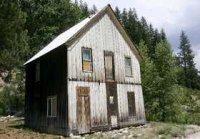 Vendesi nell’Idaho una cittadina fantasma in mezzo al nulla. Annessa alla cittā, Rocky Bar, ci sono tra l’altro un paio di hotel, una miniera ormai esaurita ma da cui venne estratto nel Diciannovesimo Secolo il corrispondente di sei milioni di dollari in oro e poco meno di una decina di acri di terreno. La notizia, aspetti economici a parte, č suggestiva, almeno per gli amanti del genere, per il carico di storia della zona:
Vendesi nell’Idaho una cittadina fantasma in mezzo al nulla. Annessa alla cittā, Rocky Bar, ci sono tra l’altro un paio di hotel, una miniera ormai esaurita ma da cui venne estratto nel Diciannovesimo Secolo il corrispondente di sei milioni di dollari in oro e poco meno di una decina di acri di terreno. La notizia, aspetti economici a parte, č suggestiva, almeno per gli amanti del genere, per il carico di storia della zona:
“I’d like to see it become a historic site,” artist Kerry Moosman said. Moosman, who lives part of the year in nearby Atlanta, owns the Masonic Hall, a house and a onetime saloon in Rocky Bar. “There’s enough left with the jail, saloon, hotel, Masonic Hall and the cemeteries that it would make a nice interpretive site where people could learn about the history of Rocky Bar,” he said.
It’s history worth learning. Tranquil Rocky Bar once had stores, bars, fraternal lodges, two hotels, a photography studio, mines, mills, a Chinese district, a tailor, a shoemaker and a newspaper. It was one of the region’s larger cities population estimates vary from 500 to 1,500 and was briefly the county seat of now-defunct Alturas County, which became all or parts of more than a dozen Idaho counties.
Rocky Bar had its own wagon road from the Oregon Trail. The steep road over the pass from Rocky Bar to Atlanta claimed the lives of seven mail carriers and was considered the most dangerous in the U.S. Historical icon Peg Leg Annie McInyre lost her legs in a blizzard there. Idaho’s territorial secretary and acting governor, Clinton DeWitt Smith who helped make Boise the capital by stealing the territorial seal and archives from Lewiston was said to have keeled over and died during a chess game at Rocky Bar. He’s buried in one of its two cemeteries.
Though the people and most of the buildings that once made Rocky Bar a vibrant community are gone, Moosman said, “Its history still makes it significant.”
Jones agreed.